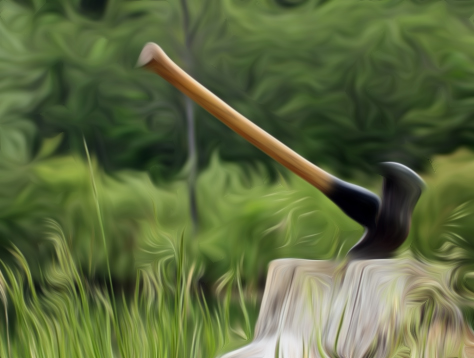
A story by Wally Gordon
Jackson and Enid moved to the mountains when he was 49 and she was 39. They bought a big house on 20 acres of dense forest an hour from the city, where they both taught at the community college. They could afford the house on teachers’ salaries only because it was rundown, the land overgrown, the property uninhabited since a bank foreclosed on it four years earlier. Jackson wasn’t sure, but Enid was, and that was that.
Five days a week Jackson and Enid drove together to work. He taught welding, spending his day with fire and fumes, on his feet all the time, sore at day’s end. She taught art and comparative religion, and talked about the gods of Hinduism and the ethics of the Tao. She helped her students make big, colorful canvases and encouraged them to pour their passions and inhibitions into tubes of paint. She assigned them symbolic subjects they could depict abstractly or representationally, as they wished. She taught them about world art, especially Hindu. When she had traveled in India for a year as a young woman, before she met Jackson, she had collected complex little sculptures of Vishnu and Shiva, the gods of creation and destruction. Together they completed the cycle of life, her life.
On weekends Jackson and Enid worked at home separately. He cleared land around the house, chipping down brush, sawing off dead branches, charging up the raucous, filthy chain saw to cut down live trees, especially the babies that circled and hemmed in the big parent trees. The big trees had been rendered almost invisible by their encircling offspring. With the offspring gone, they stood out magnificently, spreading their branches wide and soaring 60 feet above the house, making even its two-story, 3,000-square-foot bulk seem diminutive. The house was nearly a hundred years old, but its age paled in comparison with the 500-year-old piñon next to it that his labors had exposed. He stared and stared at the tree, becoming so fond of it he gave it a name: Gargantua.
Gargantua fascinated Jackson because it reminded him of himself, all 6’ 5” of himself, 205 pounds and almost none of it fat. A big guy, he towered over Enid as Gargantua did over their house. They made an odd couple, she a foot shorter than he and a hundred pounds lighter. “It’s our differences that keep us together,” she had said a few months after they married. “We each see in the other what we’re not,” he had told her when they moved into the house in the mountains. On the land that Jackson cleared, Enid planted beds of flowers and plots of vegetables and a few fruit trees. She fenced in the garden to protect it from hungry rabbits.
At night they worked at making a baby. They didn’t have a lot of time. Neither one of them did. The pressure was always there. Sometimes it inhibited sex, made orgasm impossible. Sometimes it raised sex to the magnificence of ecstasy. But always it was something they could not forget.
They had visions of their child filling the empty rooms of the big house with toys and laughter, and playing in the garden and running along the new paths in the woods. Enid would give her peaches and apples from their trees and tomatoes from the garden; Jackson would build him a treehouse, carry him on his shoulders skiing through the woods, teach him to climb the towering ponderosas. Enid imagined the baby to be a girl; Jackson imagined a boy. For both, a child would be a seal and bond, a permanent thing in a world that wouldn’t stop changing, dissolving and reappearing in a new guise; a promise that this marriage, this relationship, would be the one that lasted; unlike the past. She had never had children, and linked that lack to the failure of her two previous marriages, although neither of her husbands had wanted children, at least—she thought when the past took on the acrid stench of a spilled bottle of vinegar—not with her.
Birth, Enid believed, was the opposite of death, Yin and Yang maybe, but more nearly Shiva and Vishnu. She knew that in theory you needed both destruction and creation for completion, but she couldn’t help being partial to Vishnu, god of creation.
After a year, Jackson had slashed back the acres near the house from impenetrable forest to wide open woods, dotted with tiny meadows and pierced by networks of paths. Beside the house, she had made a garden of squash and tomatoes and corn and surrounded it with borders of peonies and sunflowers and hollyhocks and roses. She carefully fenced off the tiny orchard: a couple of apple trees, a peach tree and a cherry tree. The trees needed a lot of water, but she didn’t begrudge them. They were her children, too, and she nourished them.
Almost a year passed and soon she would be 40, he 50. Over breakfast of eggs Florentine and a bloody mary on a celebratory sunny Sunday morning she told him, “I am pregnant.”
He said what almost all men do, “Are you sure?”
And she said what almost all women do, “Of course, you idiot.”
They had bought the house because it was her desire and they would have a child because it was her dream. Now that the dream was at his doorstep, he wondered, “Is this really what I want? Is this what will be best for her, for us?” He meant, “For me?”
He had had three children, a family wrapped around the legs of the great tree of himself, and he had been so overwhelmed by the way they hid him, covered him up, made himself invisible not just to the world but to himself, that he had left that family, the kids and the wife, people he loved as much as life itself, so that he could live his life. “I can’t survive here,” he had told his first wife, and she had had no idea what he was talking about. “Why not?” she and asked. “I don’t know,” was the only rejoinder he could make, feeling ashamed as he sank into inarticulateness, unawareness.
Having learned that his new wife was pregnant, he spent every moment he could over the next nine months clearing land until all the 20 acres was done, the brush scraped away, the small trees cut down, the big ones left in solitary splendor. Then, his work done, he left his new home, his second wife and what would soon be his fourth child. Leaving, he cried, but he left anyway.
(Original photo by GollyGForce.)



Responses to “The Gardener and the Woodsman”